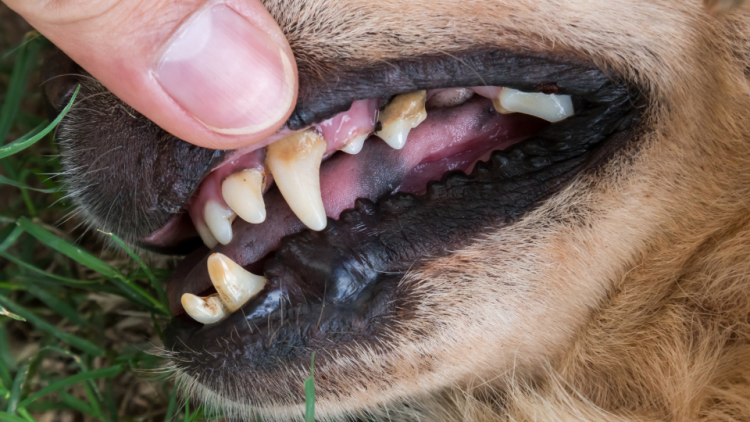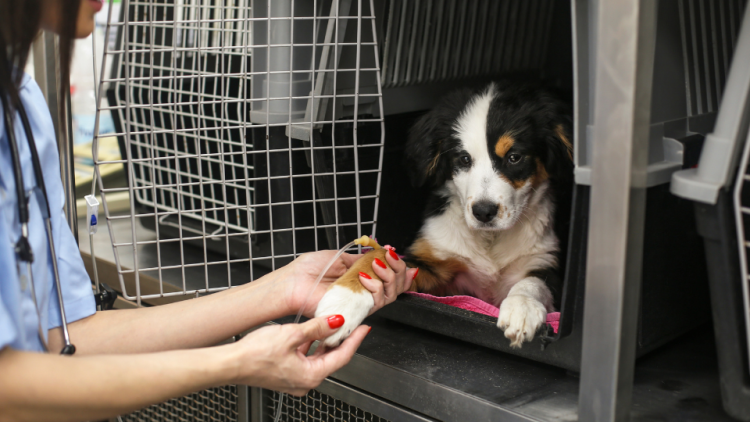Kidney failure (also known as renal failure) is the inability of a dog’s kidneys to efficiently filter byproduct waste from the bloodstream. Impaired kidney functioning can lead to many other health issues for canines.
In this post, we’ll dive into the causes of kidney failure in dogs, common symptoms you should look out for, available treatment options, and more.
Table of Contents
- Types of kidney failure in dogs
- What causes kidney failure in dogs?
- Signs of kidney failure in dogs
- Diagnosing kidney failure in dogs
- How to treat kidney failure in dogs
- Cost to treat dogs’ kidney failure
- What’s the prognosis?
- Preventing kidney failure in dogs
- Key Takeaways
Pro Tip: Not all pet insurance will cover your vet bills if your dog develops a long-term illness. That’s why it’s very important to have the right pet insurance plan in place.
Types of kidney failure in dogs
Just like in humans, healthy kidneys in dogs control blood pressure, regulate hydration, remove toxins, release hormones needed to produce red blood cells, and maintain a normal electrolyte balance. If the kidney function is impaired, kidney failure occurs. When the kidneys don’t work properly, a number of other organs can be affected, including the brain and heart.
Kidney failure (also called renal failure) in dogs can be chronic or acute:
Chronic kidney failure
This occurs when the kidneys lose function gradually and is typically caused by degeneration related to old age. Chronic kidney failure is the most common type of kidney disease in dogs, occurring in 0.5% to 1% of dogs.
Acute kidney failure
This occurs when a canine's kidney function suddenly decreases, usually within hours or a few days. It’s typically caused by a severe kidney infection or the consumption of toxins.
The main difference between these two types of kidney failure is that acute kidney failure can be reversed with timely and aggressive treatment. Chronic kidney failure, on the other hand, can’t be reversed or cured and it can only be managed. In most cases, the damage to the kidneys has been happening for more than three months and the kidneys will continue to worsen.
What causes kidney failure in dogs?
Chronic kidney failure in dogs
The exact cause of chronic kidney failure is often difficult to pinpoint because of its slow onset. Early symptoms are usually mild and can be easily overlooked or dismissed.
Dental disease is a leading cause of chronic renal failure in senior dogs. Bacteria build up in the animal’s teeth and enter the digestive system through eating and drinking, affecting the kidney’s ability to filter waste over time.

Chronic kidney failure can also be caused by:
- Congenital diseases or birth defects (such as agenesis, when the dog is born missing one or both kidneys)
- Kidney cancer (renal neoplasia)
- Polycystic kidney disease
- Kidney infections
- Fanconi syndrome
- Elevated calcium (hypercalcemia)
- Kidney stones
- Renal dysplasia
- Immune system dysfunction
- Poor blood flow to the kidneys
- Blocked urine movement or flow
- Certain medications (such as NSAIDs and some antibiotics)
Acute renal failure can also lead to chronic renal failure.
Acute kidney failure in dogs
Acute renal failure is most often a result of a dog ingesting poison. It might be antifreeze, household cleaners, or certain drugs. Some human foods like grapes and raisins have also been known to cause kidney failure if eaten frequently and in larger quantities.
Severe bacterial infections can also cause acute kidney failure. Even though kidney infections can occur spontaneously, there’s usually a reason why the dog has trouble fighting off the infection, such as urine blockage or kidney stones.
Leptospirosis is one example of a bacterial infection that can cause sudden renal failure in pups. Our canine companions can get leptospirosis by coming into contact with infected urine, water, soil, water, food or bedding, or through a bite from an infected animal. Be sure to talk to your vet about vaccinating against this disease.
Kidney issues can also result from decreased blood flow through the kidneys. This can be caused by severe dehydration (usually from severe diarrhea or vomiting), heatstroke, or snake bites, and bee stings.
Signs of kidney failure in dogs
The most common symptoms in dogs with kidney failure include:
- Excessive thirst and urination
- Lethargy
- Decreased appetite
- Weight loss
- Bad breath
- Pale gums
- Vomiting
- Blood in urine
- Ulcers in the mouth
- Uncoordinated movement such as stumbling
- Intestinal seizures
Dogs with chronic renal failure might not show any clinical signs at first, or the signs might be very subtle.
In severe renal failure, the amount of urine might actually decrease, or the dog might stop making urine altogether. As the condition worsens, other symptoms may include blood in the stool, black or tarry stool, or vomiting blood.
Diagnosing kidney failure in dogs
Blood and urine tests are commonly performed to diagnose kidney failure. Other tests, such as ultrasound, X-rays, and special blood tests might be needed in order to assess the severity of the disease and determine the cause for the failure. In some cases, a biopsy of the kidney might be recommended.
How to treat kidney failure in dogs
Treatment for kidney failure in dogs will depend on the severity of the condition and the underlying reason that caused their kidney to fail.
Dogs with acute renal failure can get very ill and might need to be hospitalized. Milder cases can be treated with antibiotics and fluids on an outpatient basis.
In some cases, dialysis might be necessary. Signs that indicate dialysis should be considered include very high potassium levels, lack of improvement in lab results while the pet receives intravenous fluids, and fluid in the lungs. Both hemodialysis and peritoneal dialysis can be effective but are generally quite expensive.
While damage from acute renal failure is more easily treated, chronic renal failure will cause irreversible damage to your dog’s kidneys unless caught early. For that reason, veterinarians generally focus on slowing down the progression of the disease and finding ways to improve the dog’s quality of life, usually with medication and diet changes.
Your pup’s treatment plan might also include:
- Electrolytes to balance out blood levels
- Medications that encourage the production of urine
- Medications to ease gastrointestinal problems
- Medications to reduce vomiting
- Medications for anemia
- Blood pressure management
If kidney disease is left untreated, end-stage renal failure might occur, leading to death. If you suspect your pet has kidney failure, contact your veterinarian or take your dog to an emergency clinic for a diagnosis and treatment.

Cost to treat dogs’ kidney failure
The cost of diagnosis and treatment will also depend on the cause, as well as on how the dog responds. Initial diagnostic tests usually range between $200 and $750, whereas long-term management of chronic kidney failure can cost between $100 and $500 per month, depending on the prescribed medications and how often IV fluid therapy is required.
Pro Tip: Every dog owner should consider pet insurance. Even if you believe you have enough money to cover veterinary costs, pet insurance could still save you thousands of dollars if your dog gets sick or injured.
What’s the prognosis?
Kidney failure is a very serious disease and about 60% of pets suffering from it will either die or be euthanized because of it. In cases when medical treatment has failed, the chance of survival without dialysis is extremely low. About half of the patients that receive dialysis will recover, depending on what caused the failure. Many of them will recover only partially and end up with permanent kidney damage.
However, some pups manage to recover completely and have a good quality of life for years after being diagnosed with the disease.
Talk to your vet about what you should expect after your dog has been diagnosed and treated for kidney failure. The vet might recommend nutritional supplements and/or a therapeutic diet to manage your pup’s condition.
Preventing kidney failure in dogs
Considering the fact that acute renal failure is usually caused by ingesting toxins or foods like raisins, preventing it is fairly easy. Make sure to get any poisons, medications, and dog-unsafe foods out of your pup’s reach. You can also get your dog vaccinated for Leptospirosis.
Chronic renal failure is usually age-related and genetically predetermined, so there’s not much you can do to prevent it. However, taking your pet for annual wellness checkups and physical exams can increase the chances of catching the disease early and start treatment before it progresses and becomes more serious.
Key Takeaways
- Kidney failure (also known as renal failure) in dogs can be chronic or acute. Acute renal failure happens quickly over several days, whereas chronic failure happens slowly over time.
- Kidney failure can be caused by a number of things, including bacterial infection, congenital disease, toxicosis, geriatric degeneration, etc.
- The most common signs of kidney failure include an increase or decrease in water consumption, increase or decrease in urine volume, vomiting, weight loss, lethargy, bad breath, etc.
- Treatment will depend on how advanced your pet's kidney disease is, but can include fluid therapy, medication, kidney dialysis, and diet change.
- If you think your pup might be experiencing renal failure, be sure to see your vet as soon as possible.
